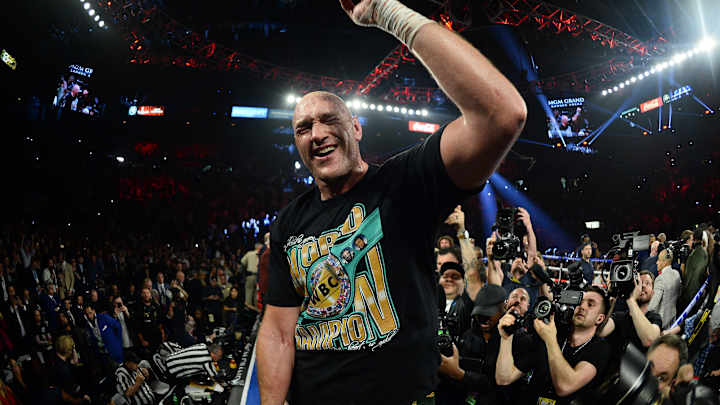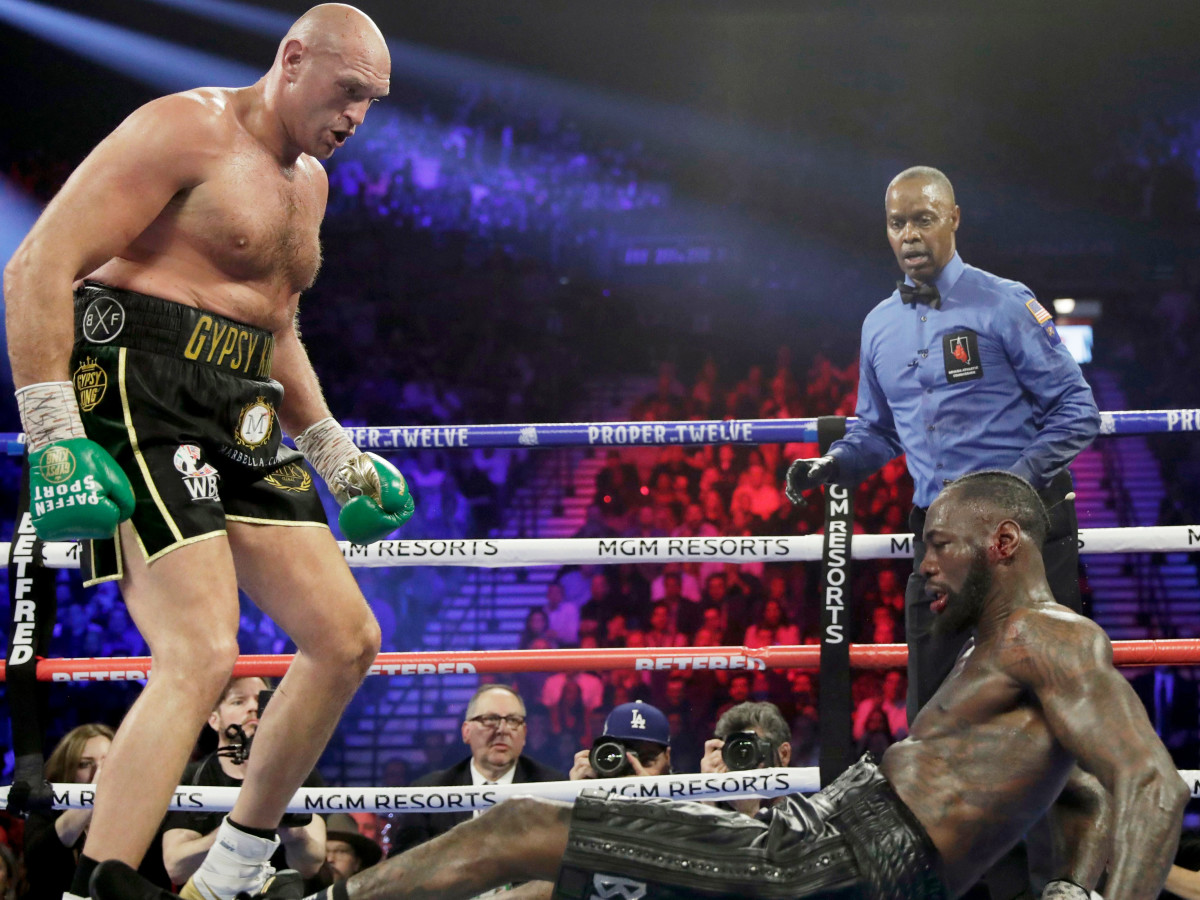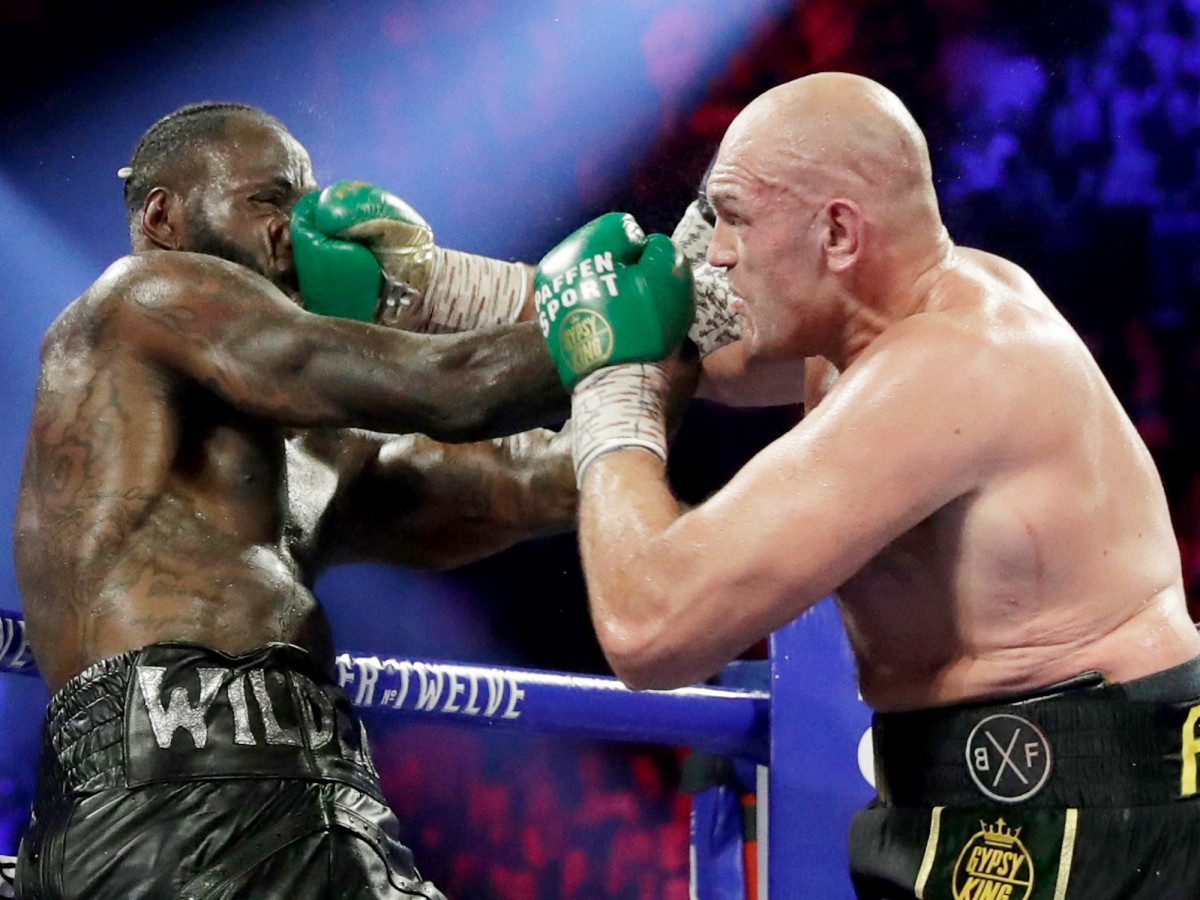The Tyson Fury Redemption: World Class Boxer Completes Return, Knocks Out Deontay Wilder

LAS VEGAS – This a story about redemption.
About a man, born one pound, three months premature, who grew up to be a 6’9”, 270-pound world class boxer.
Who ended the decade-long reign of Wladimir Klitschko.
Who gave up his titles and spiraled into a deep depression.
Who abused drugs.
Who turned his Ferrari onto a bridge at 190 miles per hour with every intention of killing himself.
Who lost more than 150 pounds and reclaimed his career.
Who stunned the boxing world by battling Deontay Wilder to a draw.
Who turned boxing upside down by knocking Wilder out.
You could have envisioned any number of scenarios entering Saturday night’s anticipated rematch between Wilder and Tyson Fury. Fury by decision? Sure. The skilled Fury proved he was the better boxer in the first fight, with Wilder needing two knockdowns just to secure a draw. Wilder by knockout? Wilder is arguably the biggest puncher in boxing history. The bettors had that as the most likely outcome.
Fury by knockout, by bell-to-bell, minute-to-minute, punch-by-punch domination?
Come on.

That’s exactly what happened inside the MGM Grand Garden Arena. In front of a sellout crowd of 15,816—a crowd that generated a $16.9 million gate, the highest grossing gate for a heavyweight fight in Nevada history—Fury gave Wilder the beating of his career. He promised to take the fight to Wilder. He did. He knocked Wilder down with a right hand in the third round. He put him down again with a crushing body shot in the fifth. Fury weighed in 17 pounds heavier from the last fight. He used every ounce of his 273-pound frame to lean on Wilder, wearing him down.
“The king,” Fury said, “has returned to the top of the throne.”
Amazing. There were plenty of reasons to doubt Fury. He looked unimpressive in his last fight, against Otto Wallin. He suffered a nasty cut above his right eye in that fight, one that required 47 stitches to close. He fired his trainer, Davison. He brought on a new coach, Sugar Hill Steward. He swore the weight gain wasn’t Andy Ruiz-type stuff. But with Fury, you never know.
Now you do. Boxing has seen its share of incredible stories. James Braddock, the Cinderella Man. Muhammad Ali, returning from purgatory. Fury’s ranks right up there. He sank to the depths of humanity. And he pulled himself out.
We knew Fury was a showman. On Saturday night, he didn’t disappoint. He wore a robe with a crown on his head. He rode to the ring on a throne. When Top Rank found out how he wanted to enter the ring, they searched local stores. When they came up empty, they found one on Amazon.
The price: $1,100.
We knew Fury could fight. He was a decorated amateur. An undefeated pro. He beat Dereck Chisora and Steve Cunningham. He outboxed Klitschko. He had skills. But this? Weeks earlier, Fury sat down with his promoter, Bob Arum. For weeks, Fury had been claiming he would jump on Deontay Wilder. He vowed to knock Wilder out in the second round.
Arum asked: Did you mean it, or was this just talk?
Fury replied: I mean it.
“And that was absolutely the best game plan,” Arum said. “You don’t fight dancing. When you do it, you are playing with fire. At any time you can get hit by the puncher's best punch.”
Fury believed in himself. And he believed in his power. He’s always been a slick boxer. But he rarely sat down on his punches. The decision to move to Sugar Hill—a student of the famed Kronk Gym—was about adding power. He felt it in camp. He used it during the fight.
“I believe in the style [Sugar Hill] teaches,” Fury said.

The end for Wilder came in the seventh round, and that’s a story in itself. Wilder was battered. His legs were failing him. A cut inside his left ear affected his equilibrium. The stress of Fury leaning on him sapped his strength. At the start of the seventh, Wilder’s assistant trainer, Mark Breland, warned Jay Deas that he was thinking about stopping it. With most teams, only the head trainer can throw in the towel. Wilder’s camp, says Deas, is run more like a football team, with Deas operating as head coach and Breland the top coordinator.
When Fury started to tee off on Wilder in the seventh, Breland said he was going to throw in the towel.
Deas said not to, knowing Wilder would prefer to go out fighting.
Breland threw it anyway.
“The best man won tonight, but my corner threw in the towel and I was ready to go out on my shield,” Wilder said. “I had a lot of things going on heading into this fight. It is what it is, but I make no excuses tonight. I just wish my corner would have let me go out on my shield. I’m a warrior. He had a great performance and we will be back stronger.”
At the press conference, Deas was asked about Breland’s decision. He said he wouldn’t have done it. He said he wished Breland didn’t do it. He said he had not talked to Breland about it—but he would.
A rematch is likely, if not immediate, eventually. Wilder has 30 days to exercise the rematch clause, but members of his team sounded like they would like to see Wilder ease back into it. Fury demurred on the question of Anthony Joshua, the three belt holder who regained his titles with a win over Andy Ruiz in December. A Fury-Joshua fight would be the biggest fight in British boxing history—and the biggest fight in boxing, period.
Fury said he is headed for vacation, and it’s well earned. Two years ago, Fury was pushing 400 pounds. His career seemed over. His life was slipping away. Standing in the ring, arms raised, Fury was a champion again. The best heavyweight in the world again.
Finally, formally, Tyson Fury was redeemed.
